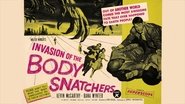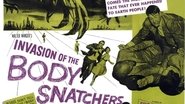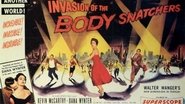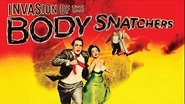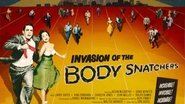paul vincent zecchino
Danny Peary, in his 'Cult Films' books series years ago correctly called this film an attack on communism, an allegorical expose of insidious commie tricks by which the reds gull the weak minded into going along with their genocidal 'utopian vision.'People appear the same on the outside, but within there has been 'revolution within the form' to use a commie phrase. This means that external appearances are the same but inside, there's another person, a whole new 'socialist man' just itching to destroy civil society and all human and animal life.
The Venona Papers and the Mitrohkin Archive, among others released during the 90s well proved the massive effort on part of the soviets to use all necessary means to subvert America from within.Job well done.
Paul Vincent Zecchino
Manasota Key, Florida
26 May, 2018
ElMaruecan82
Isn't it the scariest thing where one of your closest relatives, a parent, a child, or someone who matters acts like a total stranger? Or even worse when the person acts normally yet you feel you have no connection whatsoever or you can't seem to reach him, or her? This is the "what if" basis of classic sci-fi horror film "Invasion of the Body Snatchers", directed by Don Siegel in 1956 and that originated the term "pod people" in reference to people acting in an equally emotionless way but it's in the 'unison' aspect that the film reaches its nightmarish peak. Basically, it starts with: what if you're estranged to a love one and ends with what if you're estranged with the whole world. So the initial premise is simple but the implications are mind-boggling.The genius of the story is that it works on two levels: in microcosm, it's the relatable situation shown from an intimate perspective: a kid crying because his mother doesn't act the same, a niece feeling some emptiness in her uncle's behavior... these life details so benign and mundane hit the right chord because they're not overplayed and the supposedly 'new persons' act exactly like their counterpart would do, something has just 'changed'. The second level is macrocosmic when the 'epidemic' spreads to the whole town and people act like a civilized version of Night of the Living Dead; which is even worse because you can spot the zombies but can you distinguish between a normal average citizen and a person who lost his soul? And in-between, you have the gradual escalation of paranoia, the way where for every certitude, there's a doubt, for every suspicion, there's a rational explanation. And everything seems normal until it doesn't. The choice of the location and the casting is also crucial to the effectiveness of the story. It all takes place in a little fictional town of California, Santa Mira, and the protagonists are unknown faces, Kevin McCarthy (a mix of Gene Kelly and Dick Van Dyke) is believable as an ordinary doctor and convincing in his various embodiments of coolness, puzzlement and finally panic and madness. And Siegel never amplifies the emotions or the romantic interactions, everything is played in the most possibly low key way to accentuate the realism of the story, going from disbelief to astonishment, then suspicion, then the shocking point of no return where two survivors become persona non grata, precisely because they still have personas. Don't be fooled by the small budget B-movie feel, there are so many facets of enjoyment and appreciation on an emotional and intellectual level. Although Siegel and McCarthy refuted any political undertones, I think it's quite fair to say that the film is so multilayered you can see both the derives of conservative homeland totalitarianism or a political allegory about cultural invasion, the film can be both anti-McCarthy and anti-Soviet like a film I praised recently, "The Manchurian Candidate". In fact, the meanings are beyond any intent, it can also be seen as a denunciation of a society that would lose its capability to feel because of some brainwashing, there are countless readings but the best thing is that it's shown from the perspective of outsiders with no political luggage whatsoever and only fearing for their survival and the survival of humanity, humanity with its most precious asset: the capability to feel, to have emotions.The last act is perhaps one of the most thrilling of old-school cinema I have experienced recently, I guess it earned the film a spot in AFI's thrills with the lengthy chase scene and the unforgettable "They're here already, you're next!" "You're Next!" another sci-fi motto from the 50's along with "Keep watching the skies!" and "Klaatu Barada Nikto!", an ending that can work as a very warning to modern audiences. Indeed, the term "pod people" is very well-known and maybe if we're not standardized like the body snatchers, we should question the way Internet or social networks condition our behavior or the way media became capable to defined what it good or what is wrong, to which extent is our free will endangered, and is the fact that we don't realize it the primal symptom? And it's not just a soul matter, speaking of the body, the film features an alien in intermediary forms with human facets that seem unfinished, that's certainly an unintentional but interesting foreshadowing of the way Botox and plastic surgery will turn us into the same "plastic" clones. It's even worse with the brainwashing from medias or politics or even religion... I'm not saying the film went as far as highlighting these aspects, even Siegel and McCarthy admitted there was no politics in the story, but like good wine, some stories get better with time. One of the most popular films of 1956 is "The Searchers", I thought it had aged badly and was quite overrated, but "Invasions of the Body Snatchers" holds up pretty well and can be easily considered one of the best films of the 50's, with an iconic warning about the danger of mass-standardization.One might deplore that the film didn't end on that warning note, but I guess it was too gloomy for the 50's standard, I was looking at the screen-time surprised that the film might end without a proper resolution. I guess I don't approve the ending but I understand it, if it wasn't meant as a political allegory, it was unfortunately spoiled by studio politics.
ashild-blovvig
I decided to watch this one before the remake of 1978. I enjoy old time horror movies, they never scare me, but they can be fun to watch, either if they still hold up in some way or if they're so bad they're funny.Invasion of the Body Snatchers (amazing title btw) is lovable, though it doesn't hold too well into the 21st century. But I'll start with the things I like.There is a sort of noire like quality to it, not necessarily by plot, but just by how it looks, at least at night. I love the shot in the basement where Dr. Bennell finds the duplicate of Becky.The movie in itself is about a very unsettling topic, even if the movie itself doesn't scare as well as it might have back then. The concept of knowing people you know and love turn into mindless "robots"/"zombies"/"inhumans" is definitely scary.I really liked the special effects on the pods. Really well made for the time. The effects for the unfinished body they find in the beginning is not something to brag about, but I forgive it.The scene where the pods are given out to people by trucks works also really well. It's quiet, but we observe the whole arrangement, and realize how quickly it has become really bad.Also, bonus, surprisingly, this movie passes the Bechdel test.What I do find kind of (unintentionally) funny is the fact that it's like these characters know what kind of movie they're in. By that I mean that it takes little to no time before we're introduced to the whole "my uncle is not my uncle" thing, without any sort of build-up or any other theories. He doesn't act like normal, therefore he is an impostor, obviously. The same with the body they find at the Belicec house. I found it that they conclude a little to fast that this body isn't human. They don't realize that the body is a duplicate, but make assumptions only based on similarities in height and probably weight between the body and Jack, which I find kind of funny.The rules of how the whole transformation from normal human being to body double/alien doesn't seem to have grounded rules. We're introduced to that it takes a bit of time for a pod to produce a body, maybe not days, but maybe one day or some hours. But when Becky is finally turned, it happens in a matter of a couple of minutes, and there is no pod in sight either (it seems especially out of place since they're hiding in a cave).There's also some discontinuity in the scene where Becky and Miles are met by some of the aliens and pods are brought in to replace them. They're told they're gonna lose, the pods are brought in and put in another room, the other aliens/body snatchers go into the room with the pods, then Becky and Miles sit and are sad about their situation, but kind of as if they're trapped in the room, which they aren't at all. There's one other outside the door in the hallway, they can easily run away. When they do however overpower the body snatchers, they don't even bother to burn the pods. So the whole scene seems half-hearted, they're never really trapped, they could just run out of the room after the other two went into the room with the pods.All in all, it's an old horror/suspense movie with the charms of an old horror movie. It's not scary, but it's a nice watch, not particularly brilliant, but with several parts that catch the eye and attention, and plenty that are more boring, not because it's slow, but because of how they handle the situations.
seymourblack-1
Just like so many of the sci-fi horror films that were so popular in the 1950s, this movie is about an alien invasion but that's where the similarity ends. This movie doesn't feature monsters, violent deaths or scenes of widespread destruction but instead focuses on a far more insidious threat that seems impossible to stop and robs people of their humanity. This quiet invasion deprives its victims of their individuality, their emotions and even their objectivity because, after being transformed, the people concerned are conditioned to believe that a life without love, desire, ambition and faith is not only simpler but also preferable to the way in which they'd lived previously. The full horror of what takes place is conveyed through the experience of a small town doctor who, as a result of all that he sees and learns, goes from being perfectly calm and rational to being hysterical, terrified and completely out of control.It's in this highly agitated state that Dr Miles Bennell (Kevin McCarthy) is admitted to a hospital emergency room where he's invited by a psychiatrist to describe the events that led to his current meltdown. Bennell explains that, following a request from his nurse, he'd returned to his Santa Mira practice from a medical convention to deal with a sudden high demand for his services but, on his return, the numerous patients who'd wanted to see him urgently, had changed their minds. It soon became evident however, that something unusual was going on in the town because first a little boy who insisted his mother wasn't his mother was brought in to see him and then, he visited his ex-girlfriend's cousin who'd reported that her uncle wasn't her uncle. As there didn't seem to be any rational explanation for the apparent delusions that these people were suffering, Bennell had spoken to local psychiatrist Dr Kauffman (Larry Gates) who thought that, what was happening was probably an epidemic of mass hysteria.Bennell started to rekindle his romance with Becky Driscoll (Dana Wynter) who, like him, had recently been divorced. When the couple were out on a date one night, he'd received a telephone request to visit his friend Jack Belicec (King Donovan) who'd found, what looked like, a human body on his pool table. Disturbingly, it resembled Jack but didn't have any fingerprints or all of his facial features. Later, Bennell also found a similar incomplete duplicate of Becky in the basement of her house but when he called in Dr Kaufmann to see the "bodies", they'd disappeared and so Kaufmann simply assumed that Bennell was as deluded as some of his patients.When Bennell, Becky, Jack and his wife Teddy (Carolyn Jones) were together one night at Bennell's greenhouse and saw replicas of themselves emerging from huge seed pods, it became clear to Bennell that the townsfolk were being replaced by duplicates and that the changeover was taking place when they were sleeping. Bennell tried to contact the FBI for assistance but failed because the telephone operator repeatedly told him that the lines were busy and soon, after seeing further evidence that confirmed his theory and realising that he and Becky were the only citizens left in the town who hadn't been replaced, decided that they had to go on the run. The events that followed had then led to his breakdown.Screenwriter Daniel Mainwaring's brilliant adaptation of Jack Finney's original story called "The Body Snatchers", features dialogue that's both economical and effective and this together with Don Seigel's superb direction clearly played a major part in the success of this movie which now enjoys classic status. Seigel injects great energy, drive and pace into the action and also does a great job of building the looming sense of paranoia which becomes ever more prevalent as Bennell's predicament makes him increasingly isolated and desperate. The scene in which Bennell and Becky hide in a trench and watch their pursuers run over the planks that cover them is quite inspired and perfectly executed.The fears expressed on this movie (e.g. loss of identity, individuality and humanity) reflected the anxieties of many people in the Cold War 1950s and explains why some commentators suggested that Bennell's story had an anti-communist, anti-McCarthyite subtext which Mainwaring and Kevin McCarthy claimed was never intended.The quality of the acting in "Invasion of the Body Snatchers" is consistently good with Kevin McCarthy's performance standing out because of the range of emotions that he expresses so convincingly and the terror that he conveys so powerfully, especially in some of his close-ups. His performance was also vital to the movie's success because the whole story revolves around his character's experience.I




